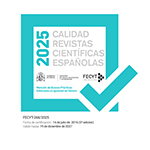From barbed wire to monitored freedom: Occupation, punishment and exclusion of the defeated in Spanish civil post-war in the province of Alicante
Abstract
This article studies the violence and exclusion of the defeated after the Spanish Civil War, by using the province of Alicante as a universe of analysis. It problematizes about the implementation of the occupation and the activities of the War Audit, paying attention to the interaction between the military, police and judicial deployment and their local collaborators. On the other hand, it describes the role played by the concentration camps and the penitentiary system in the classification, control and exclusion of the defeated, by means of an analysis of the actors and the forms of violence that accompanied the management of the prison perimeter by the occupation forces. It ends by investigating the responses that the local authorities gave to the policies of release and their implication in the discrimination of the defeated, wich exceed the regularoty framework. These ones were responsible of the decisión about who must integrated in the community or, on the contrary, tobe marginalised. The sources used in this contribution come from different national archives —AGHD, AGMA, AGMS, AGA, CDMA, AHN ACMJ—, and the Provincial Historical Archive of Alicante and from several municipal archives of Alicante.
Downloads
Article download
License
Aquellos autores/as que tengan publicaciones con esta revista, aceptan los términos siguientes:
a. Los autores/as conservarán sus derechos de autor y garantizarán a la revista el derecho de primera publicación de su obra, el cuál estará simultáneamente sujeto a la Licencia de reconocimiento de Creative Commons Reconocimiento-No comercial-Sin obra derivada 4.0 España que permite a terceros compartir la obra siempre que se indique su autor y su primera publicación esta revista.
b. Los autores/as podrán adoptar otros acuerdos de licencia no exclusiva de distribución de la versión de la obra publicada (p. ej.: depositarla en un archivo telemático institucional o publicarla en un volumen monográfico) siempre que se indique la publicación inicial en esta revista.
Plagio y fraude científico
La publicación de un trabajo que atente contra los derechos de propiedad intelectual será responsabilidad de los autores/as, que serán los que asuman los conflictos que pudieran tener lugar por razones de derechos de autor. Los conflictos más importantes pueden darse por la comisión de plagios y fraudes científicos.
Se entiende por plagio:
1.Presentar el trabajo ajeno como propio.
2.Adoptar palabras o ideas de otros autores sin el debido reconocimiento.
3.No emplear las comillas u otro formato distintivo en una cita literal.
4.Dar información incorrecta sobre la verdadera fuente de una cita.
5.El parafraseo de una fuente sin mencionar la fuente.
6.El parafraseo abusivo, incluso si se menciona la fuente.
Las prácticas constitutivas de fraude científico son las siguientes:
1.Fabricación, falsificación u omisión de datos y plagio.
2.Publicación duplicada.
3.Conflictos de autoría.












